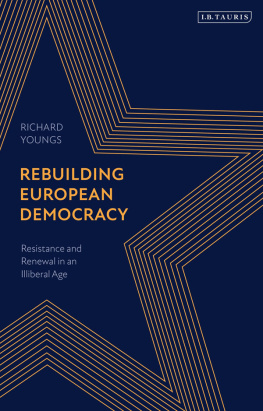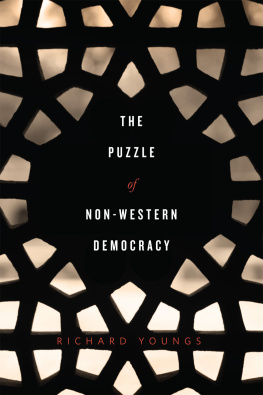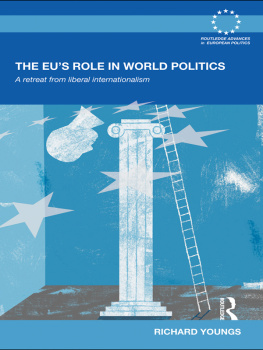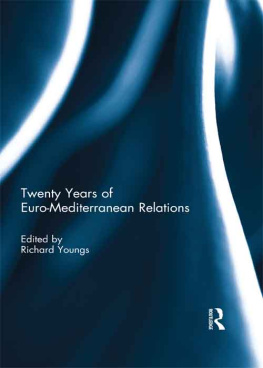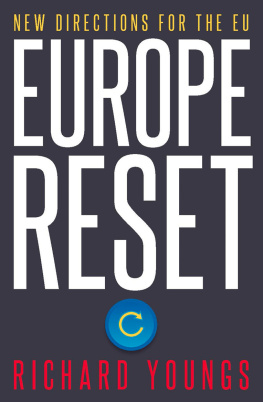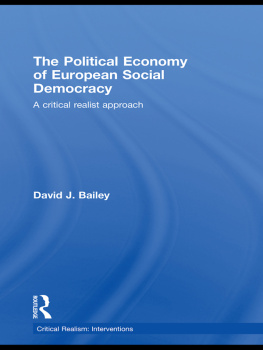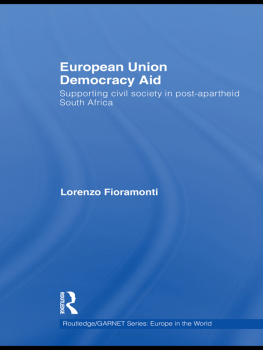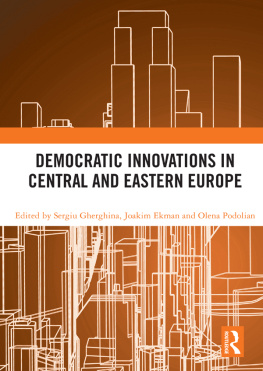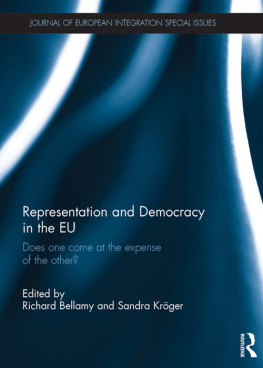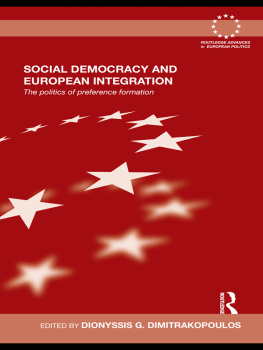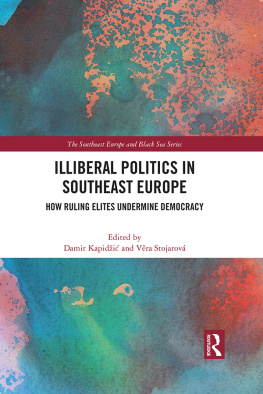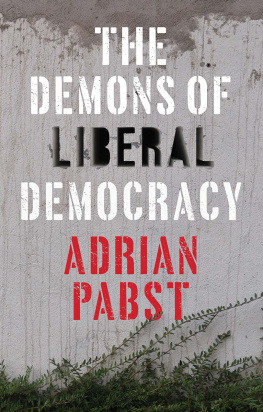Rebuilding European Democracy
Rebuilding European Democracy
Resistance and Renewal in an Illiberal Age
Richard Youngs
Contents
After a decade of worryingly adverse trends in democracy, this book goes somewhat against the analytical grain in exploring efforts to uphold and improve European democratic processes. It hopes to show that these initiatives of democratic resistance and renewal have become significant counterpoints to the many ways in which democracy has been threatened and diluted in recent years. To rebut an immediate objection, the book does not paint a rosy picture of the state of European democracy, and it does not breezily idealize or celebrate these pro-democratic actions. Yet it does start from the conviction that pro-democratic strategies have gathered a momentum that merits serious attention. A rather all-consuming focus on Europes populist surge and its implications for democracy has arguably diverted attention away from the many other important political trends and developments that have unfolded in recent years.
These themes have been central to the authors work at the Carnegie Europe think tank for several years. The book developed in particular out of a project on Reshaping European Democracy run from Carnegies Brussels office. I am grateful for support from the Carnegie team for this and other projects and to the wide range of colleagues in Brussels who have been involved in these endeavours. Our regular off-the-record seminars with policymakers ignited many of the concerns and reflections that are explored though the book. The Covid-19 pandemic complicated this project work and also presented difficult substantive questions for the books main themes; yet we were fortunate in Carnegie to count on wide-ranging participation in online debates during 2020 that helped shine a light on how democracy strategies were adapting to the crisis.
A number of people helped prepare the text and offered inputs to its different chapters, including Alberto Alemanno, Ozlem Atikcan, Cristina Buzasu, Thomas Carothers, Fernando Casal Brtoa, Katherine Chapanionek, Steve Feldstein, Nita Gegeshidze, Agata Gostyska-Jakubowska, Heather Grabbe, Poonam Joshi, Maarten de Groot, Maria Koomen, Hans Kundnani, Sarah Manney, Pawel Marczewski, Giada Negri, Elene Panchulidze, Nicole Pofcher, Mike Saward, Magdalene Segre, Louisa Slavkova, Victoria Stoiciu and Richard Wilson. At Bloomsbury, Tomasz Hoskins and Nayiri Kendir provided invaluable support in advancing the text. My work has benefited in recent years from the support that several foundations have provided to the Carnegie Endowment for International Peace for work relating to democracy and democratic activism. They include the Ford Foundation, the Hewlett Foundation and the Charles Stewart Mott Foundation. I am grateful for this support but of course remain solely responsible for the views expressed in this book.
This book is not a rallying cry for democracy and is not pitched as a series of recommendations for what governments and other actors should and should not do to preserve democracy. Rather, it is a close and critical analysis of real-life reform efforts. The books basic tenor is to engage seriously with democratic actions and ask, in constructively critical fashion, how they might become more dynamic and innovative in the future. While developing a critique of these reforms shortcomings to date, the book is written in sympathy with and great admiration for the effort of countless citizens, civic organizations, politicians, parties and officials working hard to ensure that Europes democratic weaknesses do not develop into a deeper or even fatal crisis for the continents most precious attributes of political freedom. Conversations and cooperation with many scores of these reformers inspired and informed the text. If the book helps in any way change the terms of debate over European democracy, it would be a testament to their commitment.
During the 2010s, serious concerns emerged over the state of European democracy. Indices measuring democratic quality reported year-on-year declines across countries of the European Union (EU). Governments began chipping away at civic freedoms and democratic checks and balances. In a small number of European countries, overtly authoritarian dynamics took root and illiberal populist parties gained ground. Polls regularly suggested that voters came to question democratic norms more seriously than they had for many decades. The EU faced a series of crises that accentuated citizens feeling that they had little democratic sway over decisions made in Brussels. Cutting across all these developments, digital technology increasingly appeared to be more of a threat than an enabler of personal freedom and democratic vitality.
Against this unsettling backdrop, many analysts, journalists and politicians stressed the danger of Europe descending into an era of conflict, driven by xenophobic nationalism and nativist authoritarians slowly dismantling liberal democratic rights. In 2020, the Covid-19 pandemic intensified these fears as the emergency led governments to take on far-reaching executive powers and restrict many democratic freedoms. While most of these restrictions were temporary and clearly justified in the fight against the virus, this new crisis raised the spectre of further damage to European democracy. In short, for many years perspectives on European democracy have been strikingly downbeat.
There is another side of the democratic equation, however. Citizens, civil society organizations, political parties, governments and EU institutions have gradually begun to push back in defence of democracy. Many governmental, political and social actors have developed responses to Europes democratic malaise at multiple levels from the local through to the national and EU levels. Europes democracy problems have been grave and far-reaching. Yet, a spirit of democratic resistance has slowly taken shape.
This book argues that the pro-democratic fight back may be belated, but it is real and has assumed significant traction. Efforts to rebuild European democracy have emerged at several different levels. Civic movements, national and subnational authorities, political parties and EU policymakers have all moved to upgrade their formal commitments to defend and rethink democracy. Many of them have redoubled such efforts in the wake of Covid-19. These different initiatives have not been strong or effective enough entirely to quell Europes political ill health, but they offer the promise of meaningful democratic renewal. The book argues that this needs to be advanced further in particular through more ambitious citizen-oriented political innovation.
Beyond democratic pessimism
The book examines the different forms this democratic rebuilding has taken and assesses their significance. It proceeds from the belief that a focus on democratic responses is essential to move current debate into a necessary next stage of analysis. For many years, analysts have focused mainly on stressing the scale of Europes democratic weaknesses. From the mid-2010s a raft of books and articles appeared dissecting what experts feared was democracys imminent collapse, its terminal crisis, its de-consolidation, its defeat to a forbidding return of nationalist authoritarianism across Europe. On an almost daily basis, articles
A whole cluster of different trends combined to unleash this wave of writings and fretful warnings. Hungary has moved incrementally from democracy to illiberal democracy and in the last several years towards outright authoritarianism. Since 2015, the Polish government has in a similar vein overturned several core areas of democratic politics. Though these two cases are the most visible and dramatic face of European democratic erosion, political illiberalism has also taken root across other parts of Europe. Chaotic and splenetic politics in the UK led analysts to couch Brexit as another part of European democratic meltdown. Polling seemed to suggest that European citizens have lost faith in democratic values, while external actors have also menaced democracy through digital means. Most recently, the Covid-19 emergency has clearly put additional strains on democratic systems as European governments have struggled to devise effective medical, economic and social responses.

